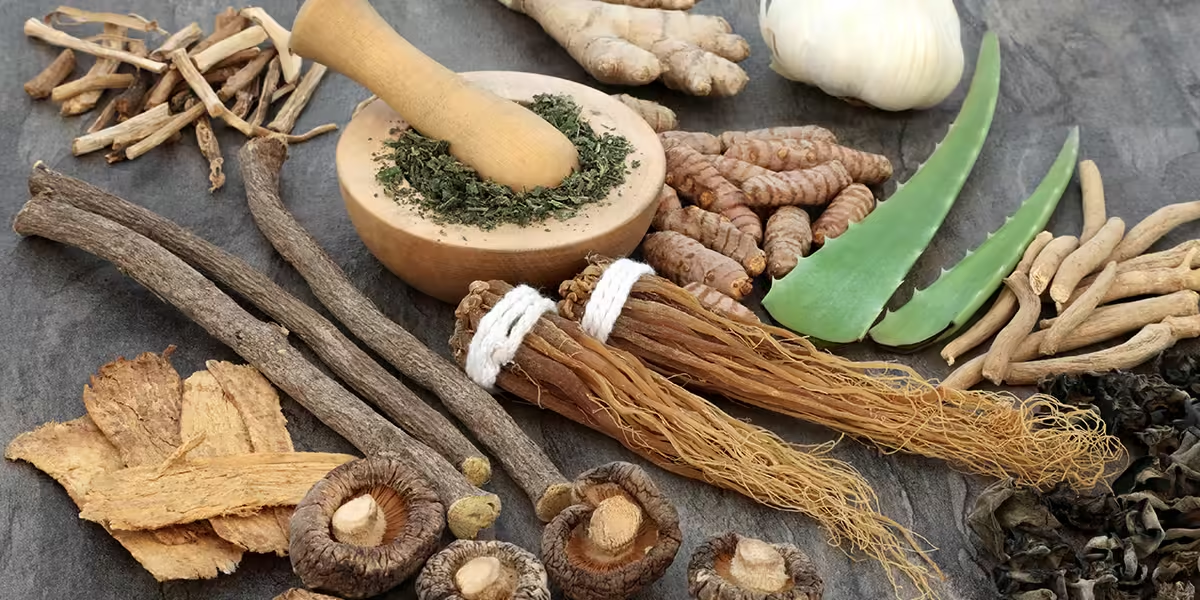Table of Contents
Discover why ashwagandha is considered the world’s most powerful adaptogen. Learn how this ancient herb helps manage stress, boost energy, and improve overall health. Explore its benefits and mechanisms of action.
Adaptogens have gained significant attention in recent years for their ability to help our bodies cope with stress and maintain balance. But among these remarkable natural compounds, one stands out as the most potent and versatile: ashwagandha. In this comprehensive guide, we’ll explore why ashwagandha is widely regarded as the world’s most powerful adaptogen, delving into its impressive range of benefits and how it works to support our health and well-being.
From its ability to modulate the body’s stress response to its positive effects on energy, cognition, and even physical performance, ashwagandha has earned its reputation through both centuries of traditional use and modern scientific research. Whether you’re dealing with chronic stress, looking to boost your vitality, or simply aiming to optimize your health, understanding the power of ashwagandha could be a game-changer in your wellness journey. Let’s dive into the fascinating world of this supreme adaptogen and discover how it might benefit you.
What are adaptogens?
So what is the most powerful adaptogen ?
Well , what is an adaptogen ?
An adaptogen is something that helps you cope with stress .
It helps you stabilize something called homeostasis .
So it’s your body’s adjusting to the environment .
So if you stood up really fast , right , and you get dizzy , that’s not adjusting to your environment .

Your body should be able to quickly shift your blood pressure and shift the blood up into your brain so you don’t pass out .
Or let’s say you run up the stairs .
Your body should adapt to that , and you shouldn’t go unconscious .
So if there’s a problem in your ability to adapt to stress , then an adaptogen can help you .
But most adaptogens focus on increasing your resistance to stress .
| Topic | Details |
|---|---|
| Most Powerful Adaptogen | Ashwagandha |
| Definition of Adaptogen | – Helps cope with stress – Stabilizes homeostasis – Helps body adjust to environment |
| Key Compound in Ashwagandha | Withanolides (a category of 300 different similar compounds) |
| How Ashwagandha Works | – Modulates HPA axis (hypothalamus, pituitary, adrenals) – Helps turn off cortisol and DHEA |
| Effects of Cortisol | – Increases blood sugar – Temporarily turns off immune system – Decreases insulin sensitivity – Increases sodium and water retention – Increases potassium excretion – Increases gastric acid – Can damage hippocampus |
| Benefits of Ashwagandha | – Lowers cortisol (AM) – Lowers DHEA (AM) – Slightly increases testosterone – Increases endurance – Increases strength – Improves emotions |
| Other Adaptogens | – Rhodiola Rosea – Panax Ginseng – Cordyceps Mushroom – Eleuthero (Siberian ginseng) – Schisandra Chinensis |
| Criteria for True Adaptogens | – Non-specific action – Normalizing effect – Lack of toxicity |
| Best Adaptogen Combinations | – Ashwagandha + Rhodiola – Panax Ginseng + Eleuthero – Cordyceps + Schisandra – Ashwagandha + Astragalus – Rhodiola + Siberian Ginseng |
The most powerful adaptogen in the world

And the most powerful adaptogen that I know is ashwagandha .
Ashwagandha does a lot , but in this topic, we’re gonna primarily focus on how it can help someone with stress .
It’s been around for a couple years , like 3000 years .
Many different cultures have used ashwagandha for all sorts of things , but primarily , most people use it to cope with stress .
The main chemical compound in ashwagandha that is responsible for this stress adaptation is withanolides .
And withanolides is kind of like a a category of 300 different similar compounds .
How ashwagandha works
So what happens when you take ashwagandha is you start , feeling calm .
You feel like you can cope better , and I’m gonna talk about why .
Number 1 , it helps to modulate or control something called the HPA axis .
This communication between the hypothalamus , pituitary , and your adrenals .
So let’s say you experience stress .

So stress is received by the body , and the hypothalamus is like the owner of the football team that sends a message to the coach , which then sends the message to the quarterback to give the play out to get everyone on the same page .
So in other words , these hormonal communications are all about getting the body ready or adapting to a stress response .
And then once the hormone does its job , adapting the body to stress , then a signal is sent back turning off this mechanism .
And this is the problem with chronic stress .
That message never comes back to turn things off .
And so we have this chronic elevation of cortisol .
Now what’s really cool about ashwagandha is it can help to turn off cortisol and another hormone called DHEA .
Now , when I talk about turn off , I’m not talking about completely , I’m talking about reducing it to a certain amount .
And so Ashwagandha in various studies , I think there’s like roughly about 41 different studies just on stress alone , but there’s a lot of other studies on a lot of different aspects of what it can do .
But in this 1 study , which I’m going to put down below , it can help reduce cortisol and DHEA .
Cortisol explained
Now the thing about cortisol , cortisol does not cause you to be stressed out .
Sometimes people say , boy , my cortisol is too high .
It’s stressing me out or my adrenals are overactive and it’s stressing me out . No .
It’s the stress that’s causing the adrenals to pump out more cortisol .
Cortisol is there just to adapt your body to stress .
It’s doing its job .

And the problem is if you’re under sustained stress , it’s just not very healthy to have your body in this state .
So let’s just take a peek at what cortisol does .
This is just some of the things that it will do .
Number 1 , I already mentioned this , it responds to stress .
It doesn’t cause stress .
It’s just adapting your body to a stress state .
So the first thing it’s gonna do is gonna increase your blood sugars .
This is called the flight or fight mode .
It’s a stress mode .
Like if there is a lion chasing you , you can either fight them or run away .
So it’s quick energy .
It’s increase or mobilize your blood sugars .

A problem with chronic stress is that sugar then will trigger insulin and convert to belly fat and a lot of other problems like high triglycerides , high cholesterol , and also it can burn out the pancreas and even cause diabetes if there’s enough of this cortisol being pumped out .
The other thing that cortisol will do , it’ll turn off certain things in our body that are not necessarily related to this present time threat .
So it temporarily turns off your immune system , so it just shuts the thing down .

This is why people take prednisone , for example , which is a synthetic cortisol for anything inflammation , autoimmune diseases , allergies , poison ivy , skin problems , lung infections , etcetera , etcetera .
So the immune system is temporarily put on pause .
The other thing that cortisol will do is it decreases the sensitivity to insulin .
Now this is not a good thing .
We want insulin very , very sensitive so it can regulate your blood sugar .
So if it makes insulin less sensitive , it actually creates insulin resistance .
What your body is trying to do is trying to prevent tissues from using glucose .
So it’s trying to conserve and use that , glucose for energy .
Now it also will increase sodium and water retention .
This is why when people are stressed , they’re just like a fluid filled sack , especially in their ankles .
At the same time , it increases potassium excretion .
So your body is getting rid of potassium and retaining sodium .
This is why when you’re under stress for a period of time , you become even more potassium depleted and you hold on more sodium .
So this is just another reason why potassium is so important during a stress state .
So , but what do people do when they’re stressed ?
They eat salty , crunchy carbs , right ?
Like potato chips or other chips , things like that .
What are they doing ?
You’re increasing more blood sugar and more salt retention .
When cortisol goes up , we also get a spike in gastric acid .

So you may find that your stomach has , like , acid reflux or just heartburn .
And if stress goes on long enough , that can irritate and create inflammation in your stomach , and that’s called gastritis .
This is 1 of the reasons why stress can actually create an ulcer and actually damage in your stomach .
But not just in your stomach , it can also damage the brain .
So chronic stress can actually cause some major damage to your hippocampus .
So then you start losing memory and the ability to learn and your cognitive function .
Let’s go back to this right here .
Ashwagandha benefits
So ashwagandha can lower cortisol to a certain degree , as well as DHEA .
What is DHEA ?
It’s kind of a precursor for cortisol and other hormones .
So this is elevated during stress .
And guess what ?
Ashwagandha actually can help lower this , which is a good indication that your body is less stressed .
If you have a lesser amount of DHEA , that’s still within the normal range and you have a lesser amount of cortisol .
So based on this study , which is a double blinded placebo test , they found , lower AM cortisol .
So lower cortisol in the morning .
There was also lower DHEA in the morning .
There was a slight increase in testosterone because stress does shut down testosterone .
So the fact that it raised was , is a good thing .
Also , ashwagandha increased endurance .

So you can go longer when you exercise , It increases strength .
Because 1 of the things that stress does is it makes you weak .
And ashwagandha is really good for someone that feels weak after stress .
Like , let’s say for example , you had some immune infection and you’re trying to recover from that because and you feel really weak .
Ashwagandha is a really good thing to increase the strength .
Or let’s say you’ve been under a lot of stress for many days , and you’re not sleeping that well .
Ashwagandha can help raise your strength so you at least don’t feel weak .

And ashwagandha showed significant improvements in emotions .
So ashwagandha has a tendency to bring you up so you’re not stuck in this stress state .
Now , if you wanted a really good ashwagandha product , I did put a link down below in the description .
key Points
- An adaptogen is something that helps you cope with stress and helps your body adjust to its environment.
- Ashwagandha has a lot of benefits, but we’re going to focus on how it can help you adapt to stress. Ashwagandha has helped many people feel calmer and like they can cope with stress easier.
- Ashwagandha helps control the HPA axis, which is the communication between your hypothalamus, pituitary, and adrenals. These hormonal communications help the body adapt to a stress response.
- Once the communication is complete, the hormone is supposed to lower back down, but with chronic stress, cortisol never goes back down and is chronically elevated. Ashwagandha can help reduce these hormones.
- Cortisol isn’t a bad thing. It doesn’t cause stress—it’s adapting your body to a stress state. But, it’s not healthy to have your body in a state of chronic stress and chronically elevated cortisol.
Potential benefits of ashwagandha:
• It helps lower cortisol in the AM
• It helps lower DHEA (a precursor to cortisol) in the AM
• It helps raise testosterone (stress lowers testosterone)
• It helps increase endurance
• It helps increase strength (stress may cause weakness)
• It has shown significant improvements in emotions
DATA
https://www.ncbi.nlm.nih.gov/pmc/articles/PMC6750292
FAQ
What is the Most Powerful Adaptogen?
Ashwagandha is widely considered the most powerful and potent adaptogen. Adaptogens are a class of natural substances that help the body adapt to stress and maintain homeostasis. Ashwagandha, also known as Withania somnifera, is an ancient Ayurvedic herb that has been used for thousands of years in traditional Indian medicine.
Some key reasons why ashwagandha is regarded as the most powerful adaptogen:
Modulates the HPA Axis
Ashwagandha has been shown to help regulate the hypothalamic-pituitary-adrenal (HPA) axis, which is the central stress response system in the body. By helping to balance cortisol and other stress hormones, ashwagandha can mitigate the negative effects of chronic stress.[1][2]
Reduces Cortisol Levels
Numerous studies have demonstrated ashwagandha’s ability to significantly lower elevated cortisol levels, the primary stress hormone. This can have wide-ranging benefits for both physical and mental health.[3][4]
Boosts Energy and Endurance
Ashwagandha has been found to enhance physical and mental energy, as well as improve exercise performance and endurance. This is likely due to its adaptogenic effects and influence on mitochondrial function.[5]
Broad-Spectrum Health Benefits
In addition to stress reduction, ashwagandha has been linked to improvements in sleep quality, immune function, cognitive function, and more. Its versatile effects make it a premier adaptogenic herb.
Overall, the combination of ashwagandha’s potent stress-relieving properties, energy-boosting effects, and wide-ranging health benefits solidify its status as the most powerful and well-researched adaptogen.
What is Stronger than Ashwagandha?
While ashwagandha is widely considered the most powerful and well-studied adaptogen, there are a few other herbs and compounds that may be equally or even more potent in certain areas:
Rhodiola Rosea
Rhodiola is another highly regarded adaptogen that has been shown to be particularly effective for enhancing physical and mental performance under stress. Some research suggests it may be more potent than ashwagandha for improving exercise capacity and cognitive function.
Cordyceps Mushroom
The medicinal fungus cordyceps has adaptogenic properties and may be even more effective than ashwagandha for boosting athletic endurance and aerobic capacity. Cordyceps has also demonstrated potent antioxidant and anti-inflammatory effects.
Panax Ginseng
Panax ginseng, also known as Asian or Korean ginseng, is one of the most well-known and extensively studied adaptogens. It may rival or even surpass ashwagandha’s benefits for improving mood, cognition, and immune function.
Synthetic Adaptogens
While natural plant-based adaptogens are generally preferred, there are also some synthetic adaptogenic compounds like bromantane, levamisole, and bemethyl that may exhibit even stronger adaptogenic effects in certain contexts. However, these are often restricted or banned for athletic use.
Ultimately, ashwagandha remains the most well-rounded and thoroughly researched adaptogen. But depending on one’s specific needs and goals, other adaptogens may be equally or more potent in certain areas.
What is a True Adaptogen?
The term “adaptogen” was first coined in 1947 by Soviet scientist Nikolai Lazarev to describe a substance that meets the following criteria:
- Non-Specific Action: An adaptogen must exert a non-specific action, meaning it helps the body adapt to various types of stress, whether physical, chemical, or biological.
- Normalizing Effect: An adaptogen must have a normalizing effect on physiology, helping to restore balance and homeostasis in the body.
- Lack of Toxicity: An adaptogen must be safe for the body, with no significant side effects or toxicity, even with prolonged use.
To be considered a true, or “classical,” adaptogen, a substance must meet all three of these criteria. Some key examples of classical adaptogens include:
- Ashwagandha (Withania somnifera)
- Rhodiola rosea
- Panax ginseng
- Eleutherococcus senticosus (Siberian ginseng)
- Schisandra chinensis
These herbs and plants have a long history of traditional use and substantial scientific research supporting their adaptogenic properties and health benefits.
In contrast, some substances that are sometimes marketed as “adaptogens” may not actually meet the full criteria. It’s important to look for high-quality, well-researched adaptogenic herbs and supplements to ensure you’re getting the true benefits.
What is a Potent Adaptogen?
A potent adaptogen is an herb, plant, or compound that exhibits particularly strong adaptogenic effects – meaning it helps the body adapt to and cope with various types of stress in a highly effective manner.
Some key characteristics of a potent adaptogen include:
Robust Anti-Stress Effects
A potent adaptogen should be able to significantly reduce the negative physiological and psychological impacts of stress, such as lowering cortisol levels and improving the body’s stress response.
Enhanced Energy and Endurance
Potent adaptogens often provide a noticeable boost in physical and mental energy, as well as improved exercise performance and stamina.
Broad-Spectrum Health Benefits
The most potent adaptogens exhibit a wide range of beneficial effects, from improved cognitive function and immune support to better sleep and cardiovascular health.
Rapid Onset of Effects
Potent adaptogens tend to produce noticeable results relatively quickly, within days or weeks of regular supplementation.
Extensive Scientific Research
The most potent adaptogens have been the subject of extensive clinical studies and scientific scrutiny, validating their efficacy.
Based on these criteria, some of the most potent and well-researched adaptogens include:
- Ashwagandha (Withania somnifera)
- Rhodiola rosea
- Panax ginseng
- Cordyceps mushroom
- Eleuthero (Eleutherococcus senticosus)
These adaptogens have consistently demonstrated robust stress-relieving, energy-boosting, and wide-ranging health benefits in both human and animal studies. Their potency makes them invaluable for supporting overall well-being, especially in the face of modern stressors.
List of Adaptogens and Benefits
Here is a list of some of the most well-known and researched adaptogenic herbs and their primary benefits:
Ashwagandha (Withania somnifera)
- Reduces stress and anxiety
- Lowers cortisol levels
- Boosts energy and endurance
- Improves cognitive function
- Supports immune function
Rhodiola Rosea
- Enhances physical and mental performance under stress
- Increases resistance to fatigue
- Improves mood and cognitive function
- Supports heart health
Panax Ginseng
- Enhances physical and cognitive performance
- Improves mood and well-being
- Supports immune function
- May have anti-aging effects
Cordyceps Mushroom
- Boosts athletic endurance and aerobic capacity
- Supports lung and respiratory health
- Exhibits potent antioxidant and anti-inflammatory effects
- May improve sexual function
Eleuthero (Eleutherococcus senticosus)
- Enhances physical and mental stamina
- Supports immune function
- May improve cognitive function
- Exhibits neuroprotective effects
Schisandra Chinensis
- Improves physical and mental performance
- Supports liver and detoxification function
- Exhibits antioxidant and anti-inflammatory properties
- May improve sleep quality
Astragalus Membranaceus
- Supports immune function and resistance to illness
- Exhibits anti-aging and longevity-promoting effects
- May improve cardiovascular health
- Supports healthy blood sugar levels
By incorporating these potent adaptogens into your lifestyle, you can experience a wide range of benefits for both physical and mental well-being.
Best Adaptogens for Anxiety and Depression
Certain adaptogens have shown particular promise for helping to alleviate symptoms of anxiety and depression. Some of the top adaptogenic herbs for these conditions include:
Ashwagandha (Withania somnifera)
Numerous studies have found that ashwagandha can significantly reduce symptoms of anxiety and depression, likely due to its ability to lower cortisol levels and regulate the stress response.
Rhodiola Rosea
Rhodiola has been shown to have anti-anxiety and antidepressant-like effects, potentially by modulating neurotransmitters like serotonin and dopamine.
Panax Ginseng
Ginseng may help improve mood, reduce anxiety, and alleviate symptoms of depression, potentially through its influence on the HPA axis and neuroprotective effects.
Eleuthero (Eleutherococcus senticosus)
Also known as Siberian ginseng, eleuthero has been used traditionally to help manage stress and anxiety. Some research indicates it may also have mild antidepressant properties.
Schisandra Chinensis
The adaptogenic and neuroprotective effects of schisandra may make it beneficial for reducing anxiety and improving mood, though more research is still needed.
When choosing an adaptogen for anxiety or depression, it’s often best to try a combination of complementary herbs like those listed above. This can provide a synergistic effect for more comprehensive stress and mood support.
Best Adaptogen Combinations
Combining multiple adaptogens can often produce enhanced or synergistic benefits compared to using a single adaptogen alone. Here are some of the best adaptogen combinations:
Ashwagandha + Rhodiola
This pairing can provide a powerful stress-relieving and energy-boosting effect, helping to improve both physical and mental resilience.
Panax Ginseng + Eleuthero
The cognitive-enhancing, mood-elevating, and immune-supporting properties of these two adaptogens make them a complementary duo.
Cordyceps + Schisandra
This combination can offer comprehensive benefits, including improved athletic performance, better liver function, and enhanced antioxidant protection.
Ashwagandha + Astragalus
Together, these adaptogens can help regulate the stress response, support immune function, and promote overall well-being.
Rhodiola + Siberian Ginseng
This pairing may be particularly useful for combating fatigue, enhancing cognitive function, and improving physical endurance.
When taking adaptogen combinations, it’s important to start with lower doses and gradually increase as needed. Consulting with a healthcare professional can also help ensure you’re using the right adaptogenic herbs for your specific needs.
Best Adaptogen Supplements
When it comes to adaptogen supplements, quality and purity are paramount. Here are some of the best adaptogen supplements on the market:
Ashwagandha Supplements
Look for high-quality ashwagandha extracts standardized for withanolides, the key active compounds. Brands like Gaia Herbs, NOW Foods, and Thorne Research offer excellent ashwagandha supplements.
Rhodiola Rosea Supplements
Seek out rhodiola supplements that are standardized for rosavin and salidroside content. Brands like Solgar, Nature’s Way, and Planetary Herbals produce reliable rhodiola supplements.
Cordyceps Supplements
For cordyceps, look for products made from the whole fruiting body rather than just the mycelium. Host Defense, OM Mushrooms, and Mushroom Matrix are reputable cordyceps supplement brands.
Adaptogen Blends
Many supplement companies offer comprehensive adaptogen blends that combine several herbs like ashwagandha, rhodiola, and ginseng. Examples include Gaia Herbs’ Adrenal Health and Thorne’s Adaptogen Complex.
Organic, Non-GMO Adaptogens
When possible, choose organic and non-GMO adaptogen supplements to ensure purity and potency. Brands like Organic India, Herb Pharm, and MediHerb are good options.
Always consult with a healthcare professional before starting any new adaptogen supplement regimen, especially if you have any underlying health conditions or are taking medications.
Adaptogenic Foods List
In addition to adaptogen supplements, there are many adaptogenic foods that can be incorporated into your diet. Here are some of the top adaptogenic foods:
Ashwagandha
The root of the ashwagandha plant can be consumed as a powder, tea, or tincture.
Rhodiola Rosea
The roots of rhodiola can be eaten raw, added to smoothies, or made into tea.
Ginseng
Both the roots and leaves of ginseng plants can be consumed, often in teas or tinctures.
Cordyceps Mushrooms
These medicinal mushrooms can be added to soups, stir-fries, or made into a tea.
Eleuthero (Siberian Ginseng)
The roots of eleuthero can be consumed in a similar fashion to other adaptogenic herbs.
Schisandra Berries
These tart, adaptogenic berries can be eaten raw, added to smoothies, or made into a tea.
Astragalus Root
The root of the astragalus plant can be used in soups, stews, or as a tea.
Maca Root
This Peruvian root vegetable can be added to smoothies, baked goods, or consumed as a powder.
Incorporating these adaptogenic foods into your regular diet can provide a natural way to support your body’s stress response and overall well-being.
Chinese Herbs to Reduce Cortisol
Several traditional Chinese herbs are known for their adaptogenic properties and ability to help regulate cortisol, the primary stress hormone. Some of the top Chinese herbs for reducing cortisol include:
Ashwagandha (Withania somnifera)
As mentioned previously, ashwagandha is one of the most potent adaptogens for lowering elevated cortisol levels.
Ginseng (Panax ginseng)
Ginseng has been shown to help modulate the hypothalamic-pituitary-adrenal (HPA) axis, leading to reduced cortisol secretion.
Schisandra (Schisandra chinensis)
The adaptogenic and antioxidant effects of schisandra may contribute to its ability to decrease cortisol levels.
Licorice Root (Glycyrrhiza glabra)
Licorice root contains compounds that can inhibit the enzyme responsible for cortisol metabolism, leading to lower circulating cortisol.
Astragalus (Astragalus membranaceus)
Astragalus has been shown to help regulate the stress response and mitigate the negative effects of elevated cortisol.
Eleuthero (Eleutherococcus senticosus)
Also known as Siberian ginseng, eleuthero may help reduce cortisol levels and improve the body’s resistance to stress.
These Chinese adaptogenic herbs can be consumed in various forms, such as teas, tinctures, or capsules. Consulting with a qualified herbalist or healthcare provider can help determine the most appropriate adaptogenic herbs and dosages for your individual needs.
Best Adaptogens for Weight Loss
While adaptogens are not a direct weight loss solution, certain adaptogenic herbs may support weight management efforts in a few key ways:
Stress Reduction
By helping to lower cortisol levels and regulate the stress response, adaptogens like ashwagandha and rhodiola can mitigate the negative effects of chronic stress on weight.
Metabolic Support
Some adaptogens, such as Siberian ginseng and cordyceps, may help improve metabolic function and energy expenditure, which can aid in weight loss.
Appetite Regulation
Adaptogens like maca and astragalus have been shown to help modulate appetite hormones, potentially supporting healthier eating habits.
Improved Exercise Performance
Many adaptogens, including rhodiola and cordyceps, can enhance physical endurance and exercise capacity, leading to more effective workouts and calorie burn.
Reduced Inflammation
The anti-inflammatory properties of adaptogens like schisandra and astragalus may help reduce obesity-related inflammation.
Some of the best adaptogenic herbs for weight loss support include:
- Ashwagandha
- Rhodiola rosea
- Siberian ginseng
- Cordyceps
- Maca




